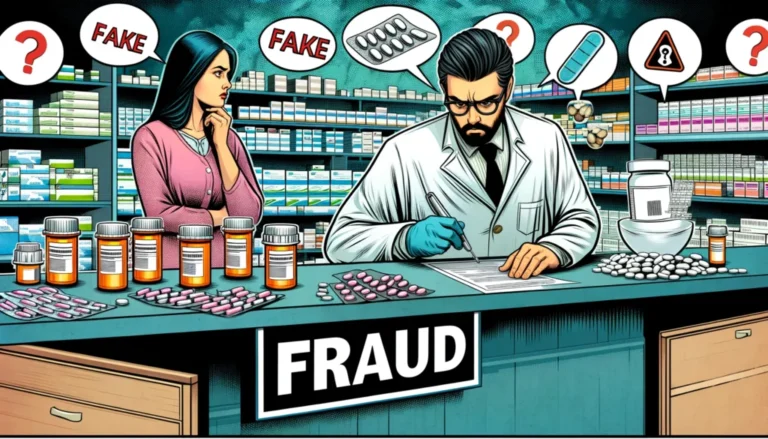Are you researching fraud in pharmacies? Congress enacted the False Claims Act in 1863 during the American Civil War to combat fraud against the U.S. government. Congress substantially strengthened the law in 1986.
Under the False Claims Act, any person or entity that knowingly submits false or fraudulent claims for payment to any office or agency of the U.S. government is liable for three times the government’s damages, along with other potential penalties.
For example, consider a medical practice that submits claims to the Centers for Medicare and Medicaid Services. They are seeking a reimbursement of $10,000.00, but the actual service value was only $5,000.00. The medical practice would be liable to the government for $15,000.00 (three times the amount it fraudulently overcharged the government).

Preventing fraud in pharmacies
Under the False Claims Act, the government can take action on its behalf. The statute also authorizes private citizens to take action on the government’s behalf against defendants who engage in fraud.
A qui tam action allows private citizens, known as “relators,” to bring claims. A successful relator typically receives a percentage of the government’s recovery.
This amount can range from 15% to 30% of the total amount recovered. The FCA offers financial rewards to incentivize people with information about fraud to report it to the Justice Department.
Hundreds of False Claims Act actions are filed in the U.S. each year. During fiscal year 2023, the U.S. Department of Justice recovered over $2.68 billion in settlements and judgments from FCA claims.
Fraud by Specialty Pharmacies
Specialty pharmacies provide medications and services for complex or rare health conditions, such as cancer, multiple sclerosis (MS), rheumatoid arthritis, inflammatory bowel disease, psoriasis, blood clotting disorders, and infertility.
Such pharmacies primarily dispense specialty medications, which are often very expensive. Many of them can cost hundreds of dollars or more per treatment. Specialty medications account for about half of total annual medication spending in the U.S. Many of these medications may require special handling, administration, or storage.
Because these specialty medications are so expensive, hundreds of millions of dollars may be at issue in FCA claims stemming from fraudulent behaviour on the part of specialty pharmacies.
Tackling fraudulent activities in pharmacies
For example, in the fall of 2015, the U.S. Attorney for the Southern District of New York finalized a $390 million settlement against Swiss Pharmaceutical Corporation NOVARTIS in a lawsuit based on claims that the company gave kickbacks to numerous specialty pharmacies in return for recommending two of its drugs to their patients.
In a similar action that was resolved in February of this year, the U.S. Attorney for the Eastern District of Pennsylvania entered into a $20 million settlement with the Delaware-based specialty pharmacy BioTek in connection with an FCA case alleging that the company was paying kickbacks to physicians and patients and submitting false claims to CMS.
Two former BioTek employees blew the whistle on the company’s scheme and provided the government with much of the evidence it needed to bring the case.

Fraud by Pharmacy Benefit Managers
Pharmacy Benefit Managers are third-party administrators who manage prescription drug programs. Essentially, PBMs act as intermediaries between health insurance providers and pharmaceutical companies, negotiating costs, rebates, and payments throughout the supply chain.
PBMs create and maintain lists of prescription medications covered by health insurance plans called formularies. Express Scripts, a Pharmacy Benefit Manager, settled a claim under the False Claims Act filed against the District of Delaware for $7.9 million.
The case involved allegations that Express Scripts accepted kickbacks from the pharmaceutical company AstraZeneca in exchange for an exclusive designation of the drug Nexium in its formularies.
Caremark, LLC, a PBM operated by CVS, agreed with the U.S. Attorney for the Western District of Texas to pay the U.S. $6 million to settle an FCA case. Allegedly, they failed to reimburse CMS for prescription drug costs.
In short, specialty pharmacies and PBMs dispense billions of dollars worth of medications. This comes through the U.S. each year, and many of them engage in fraud against the government.
Conscientious people can benefit the public by providing information about this type of fraud. By bringing it to the attention of the Justice Department, they can often secure a financial reward for themselves. They can also seek the aid of an experienced False Claims Act attorney.
Author: Joshua M. Baker, Esq. of Young Law Group,
Joshua M. Baker is an experienced False Claims Act attorney and whistleblower advocate at Young Law Group. He specializes in fraud cases involving pharmacies and healthcare organizations


